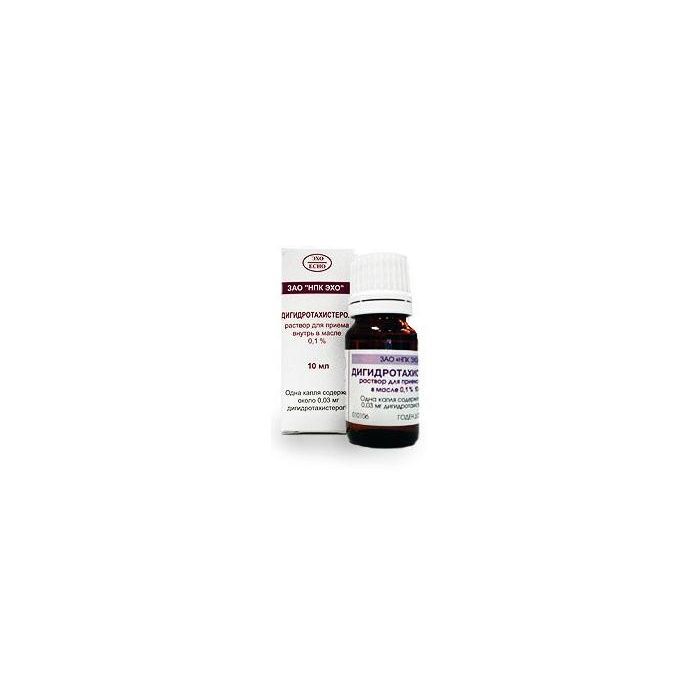Dihydrotachysterol | Dihydrotachysterol vials 0.1%, 10 ml
Special Price
$20.58
Regular Price
$28.00
In stock
SKU
BID473215
Latin name
Dihydrotachysterol
Dihydrotachysterol
Latin name
Dihydrotachysterol
Packing
Bottle of 10 ml.
Pharmacological action
dihydrotachysterol - agent regulating metabolic processes. Regulator of calcium and phosphorus metabolism. Dihydrotachysterol increases the absorption of calcium in the intestine, thereby increasing its level in the blood. The drug also increases the excretion of inorganic phosphorus by the kidneys. Dihydrotachysterol can be used for a long time without the development of the effects of overdose or tolerance.
The effect of the drug appears faster at the beginning of treatment and is shorter after the end of the course than vitamin D, which reduces the risk of drug accumulation in the body and the development of hypercalcemia. Dihydrotachysterol can exhibit toxic effects at a dose of about 25 mg per day, which is manifested by symptoms of hypercalcemia. It is not addictive.
Contraindications
Hypercalcemia, hypervitaminosis D, hypersensitivity to dihydrotachysterol and other vitamin D preparations.
Special instructions
Use with caution in patients with urolithiasis.
Concomitant use with other D vitamins, calcium preparations, and parathyroid agents is not recommended.
Dihydrotachysterol should not be used in patients with allergic reactions to nuts (including peanuts).
When used against thyroid hormone replacement therapy, correction of the dosage regimen of dihydrotachysterol may be required.
Composition
1 vial contains:
Active ingredient: dihydrotachysterol - 1 mg
Excipients: refined deodorized sunflower oil or refined deodorized soybean oil up to 1 ml.
Dosing and Administration
When administered orally, the daily dose is 0.25-1.5 mg. The frequency of use depends on the indications and concentrations of calcium in the blood and urine.
Side effects of the
Digestive system: anorexia, nausea, vomiting, diarrhea when used in high doses - biliary dyskinesia.
From the side of the cardiovascular system: palpitations are rare - heart rhythm disturbances.
From the side of metabolism: thirst, tissue calcification.
From the urinary system: with prolonged therapy - impaired renal function.
Other: pallor of the skin, headache.
Drug interaction
With the simultaneous administration of dihydrotachysterol with vitamin D, as well as with drugs and dietary supplements containing calcium, the development of hypercalcemia is possible.
With the simultaneous administration of dihydrotachysterol with thiazide diuretics and rifampicin, hypercalcemia may occur.
Dihydrotachysterol enhances the action of cardiac glycosides and calcium antagonists. With the simultaneous administration of cardiac glycosides or calcium antagonists with dihydrotachysterol, a reduction in the dose of the latter is possible.
Barbiturates (phenobarbital), antiepileptic drugs [phenytoin (diphenin), carbamazepine (finlepsin), primidone (hexamidine)], anion exchange resins (colestyramine, colestipol) and petrolatum weaken the pharmacological effect of dihydrotachs.
If, on the background of taking dihydrotachysterol, thyroxine is simultaneously treated, then after its withdrawal hypercalcemia may develop.
Storage Conditions
In a dark place at 0-15 РC.
Expiration
2.5 years
Terms leave through pharmacies
In retseptu
Drug form
oral solution for
Possible product names
Dihydrotachysterol vials 0.1%, 10 ml
ECHO NPK, Russia
Dihydrotachysterol
Packing
Bottle of 10 ml.
Pharmacological action
dihydrotachysterol - agent regulating metabolic processes. Regulator of calcium and phosphorus metabolism. Dihydrotachysterol increases the absorption of calcium in the intestine, thereby increasing its level in the blood. The drug also increases the excretion of inorganic phosphorus by the kidneys. Dihydrotachysterol can be used for a long time without the development of the effects of overdose or tolerance.
The effect of the drug appears faster at the beginning of treatment and is shorter after the end of the course than vitamin D, which reduces the risk of drug accumulation in the body and the development of hypercalcemia. Dihydrotachysterol can exhibit toxic effects at a dose of about 25 mg per day, which is manifested by symptoms of hypercalcemia. It is not addictive.
Contraindications
Hypercalcemia, hypervitaminosis D, hypersensitivity to dihydrotachysterol and other vitamin D preparations.
Special instructions
Use with caution in patients with urolithiasis.
Concomitant use with other D vitamins, calcium preparations, and parathyroid agents is not recommended.
Dihydrotachysterol should not be used in patients with allergic reactions to nuts (including peanuts).
When used against thyroid hormone replacement therapy, correction of the dosage regimen of dihydrotachysterol may be required.
Composition
1 vial contains:
Active ingredient: dihydrotachysterol - 1 mg
Excipients: refined deodorized sunflower oil or refined deodorized soybean oil up to 1 ml.
Dosing and Administration
When administered orally, the daily dose is 0.25-1.5 mg. The frequency of use depends on the indications and concentrations of calcium in the blood and urine.
Side effects of the
Digestive system: anorexia, nausea, vomiting, diarrhea when used in high doses - biliary dyskinesia.
From the side of the cardiovascular system: palpitations are rare - heart rhythm disturbances.
From the side of metabolism: thirst, tissue calcification.
From the urinary system: with prolonged therapy - impaired renal function.
Other: pallor of the skin, headache.
Drug interaction
With the simultaneous administration of dihydrotachysterol with vitamin D, as well as with drugs and dietary supplements containing calcium, the development of hypercalcemia is possible.
With the simultaneous administration of dihydrotachysterol with thiazide diuretics and rifampicin, hypercalcemia may occur.
Dihydrotachysterol enhances the action of cardiac glycosides and calcium antagonists. With the simultaneous administration of cardiac glycosides or calcium antagonists with dihydrotachysterol, a reduction in the dose of the latter is possible.
Barbiturates (phenobarbital), antiepileptic drugs [phenytoin (diphenin), carbamazepine (finlepsin), primidone (hexamidine)], anion exchange resins (colestyramine, colestipol) and petrolatum weaken the pharmacological effect of dihydrotachs.
If, on the background of taking dihydrotachysterol, thyroxine is simultaneously treated, then after its withdrawal hypercalcemia may develop.
Storage Conditions
In a dark place at 0-15 РC.
Expiration
2.5 years
Terms leave through pharmacies
In retseptu
Drug form
oral solution for
Possible product names
Dihydrotachysterol vials 0.1%, 10 ml
ECHO NPK, Russia
Write Your Own Review

